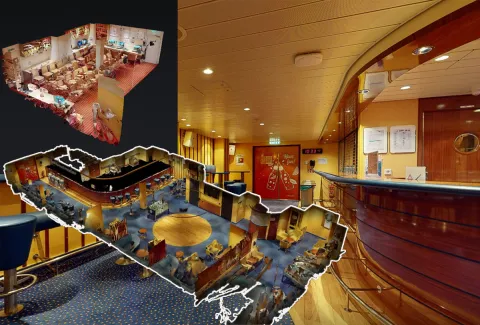
It is early Sunday morning at the Port of Miami. Today some 200 new sign-on and returning crew members from different courtiers around the world will arrive at the Miami International Airport ready to join the cruise ships. Once they pass the migration they will board the ship and off to different trainings, orientation and on duty. All of them (without exception) no matter if they are first timers or returning crew will suffer from Jet Lag.
What is Jet Lag?
Jet lag is a temporary disorder that causes fatigue, tiredness, and other symptoms as a result of air travel across time zones. It is considered a circadian rhythm sleep disorder, which is a disruption of the internal body clock.
Remember how you feel tired, sleepy and you cannot focus during your safety training on your first day onboard. All of the crew are trying to stay awake and pretend they are listening to the Safety Officer while he taka-taka and their body scream for a sleep. This is because of the fact that your body is still in your time zone back home.

Scientists say that travelers need to adjust to the new time zone at least three days before the flight and three more once they arrived. Now crew members can only adjust prior their arrival and once on board, they can’t do anything because from the first day they are working. So the only solution is to adjust to the new time zone at home and try to go to sleep using the new time zone three days prior to the arrival. I know many of you don’t do this, I sure didn’t while working on board, but this is very important in order to reduce the stress on your body with the new time zones.
If you think that making more money during your contract is your number one priority by going one step further to make guests happy, you are wrong, your biggest priority is your health. Now I can’t say that cruise lines treat you just as number and they don’t care about your health (this is each crew member personal perception and experience). But this is how their system works, there is no time to take a rest because the show must go on and you are needed. So you are most responsible for your health, and if you don’t care why should they. That’s why I underline that you need to adjust to your new time zone when you are at home.
One Hour Forward/Back Tonight

Onboard we have all seen these announcements and adjusted our alarms accordingly. If one hour back this means more time in the crew bar, if forward well go to bed early. However, these body shocks reflect on our health.
Fatigue experts say that – on average – it takes travelers about a day per time zone to adapt. Another study shows that traveling over two time zones will have a marginal effect to a person’s internal body clock, but traveling over any more than three can cause desynchronization to a substantial degree.
Extreme cases of distortion of our internal body clock are when the cruise ships sail on a repositioning cruise across the Atlantic or the Pacific Ocean. If the ship sails from Miami to Portugal you will change 6 time zones, meaning that almost each day is one hour forward. This causes desynchronization to a substantial degree, and crew members can suffer from symptoms such as dizziness, lack of focus, depression or insomnia. Almost all of us have woken up in our cabin in the middle of the night stressed that we are late on duty. During the winter season, cruise ships are going back from Europe to the Caribbean or South America. Now we have reversed change of time meaning one hour back, however, there is one problem and that is the USPH special cleaning. During this time all cruise ships prepare for the unannounced inspection which can be conducted in any US port-of-call. Each night during the transatlantic cruise crew has special cleaning with onboard inspectors. This adds extra pressure on the crew and the one hour back means absolutely nothing.
Jet Lag Circadian fatigue disruption - why it occurs, health effects, how to reduce it
According to the International Maritime Organisation (IMO), mental fatigue is mainly a consequence of mental stress and emotional exhaustion, or high workload such as long working hours. In particular disruption of the sleep-wake cycle and circadian rhythm, which is occurring in jet lag and shift work, causes irregularity of work and sleep and reduces the amount and quality of sleep between work cycles.
There is no specific study on how this disorder reflects on cruise ship crew health traveling to different time zones and unfortunately, there are no trainings that address this problem. Therefore we will use the more extreme case of Aircrew members.
The CDC publication shows that travelers who get circadian disruption after a single flight recover after 1-2 weeks, many crewmembers are continually exposed and show evidence of chronic circadian rhythm disruption. Some crewmembers may have higher exposure to circadian disruption than most of their coworkers and thus may be at greater risk for possible health effects.
Disrupting your biological clock and sleep cycle can cause much more than problems with sleeping. It can also change normal conditions and processes in the body, including increased hormone levels.
The study says that working as a flight attendant or pilot may affect their reproductive health because of some of the hazards of the job, (almost the same hazards that cruise ship crew experience) such as:
- Circadian rhythm disruption (jet lag) or shift work
- Working when you would normally be asleep
- Long working hours
- Working across time zones
- Physical job demands, such as:
- Standing for long periods of time
- Heavy lifting
- Bending from the waist
International Maritime Organisation Recommendations
IMO recommends that a seafarer can benefit from taking actions such as calming down and avoiding caffeine and alcohol prior to sleep. It is important to spend as much time as possible in daylight, and to be active (physically and mentally) during the day but not too close to bedtime. Relaxing, reading or listening to soothing music before sleeping can help getting ready for sleep. Nicotine and alcohol should be avoided 2 h before sleep, and caffeine 6 h before sleep. Heavy exercise should also be avoided 2 h before going to bed. If hungry, only light food is recommended.
Crew Insights
Articles and experiences shared by crew members working on cruise ship. Find out more about ship life at sea together with tips and advices for first time crew members and cruise oldtimers.












